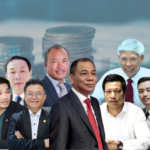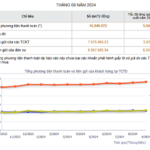State-owned enterprises are yet to divest from banks
In a recent report to the National Assembly on the implementation of the National Assembly’s Resolution on questioning, Governor of the State Bank of Vietnam Nguyen Thi Hong stated that over the years, the State Bank has been perfecting the legal basis and aggressively implementing solutions to prevent and handle cross-ownership, cross-ownership, and investment beyond prescribed limits, along with the restructuring of credit institutions.
Specifically, the Law on Credit Institutions 2024 has supplemented provisions to help enhance the prevention of investment and cross-ownership, as well as ownership with a manipulative and dominant nature in credit institutions.
The State Bank also continues to direct the prevention and handling of share ownership beyond prescribed limits, cross-ownership, and improper lending and investment.
So far, cross-ownership between credit institutions and related parties of credit institutions contributing capital and purchasing shares in other credit institutions has decreased significantly (rectifying the situation of commercial bank ownership of shares in another credit institution exceeding the prescribed ratio of 5% of the voting shares of that credit institution).
Shareholders and related parties owning shares beyond the prescribed limits are mainly in state-owned corporations and enterprises, and further direction is needed to focus capital on their primary business activities and improve capital efficiency.

Commercial banks face challenges in requesting state-owned enterprise shareholders to divest.
The State Bank stated that cross-ownership may involve multiple entities under the management of various ministries and sectors.
Presently, there remains the issue of share ownership beyond the prescribed limit at state-owned commercial banks, with a significant ownership ratio. These commercial banks face challenges in requesting these shareholders to divest.
No solution yet for “holding shares on behalf of others” situation
Regarding the detection, prevention, and handling of cross-ownership and manipulative and dominant ownership in credit institutions, Governor Nguyen Thi Hong admitted to facing numerous difficulties.
Specifically, controlling cross-ownership is challenging when shareholders and related parties intentionally conceal their ownership by asking individuals or organizations to hold shares on their behalf, circumventing regulations on cross-ownership and ownership limits.
This leads to potential risks of opacity and a lack of transparency in the operations of credit institutions. Such practices can only be discovered and identified through investigations by investigative agencies according to legal regulations.
Identifying relationships between enterprises remains limited due to the difficulty in obtaining information to determine ownership relationships, especially for non-public companies. Consequently, the State Bank lacks autonomy in information retrieval and assessing the accuracy and reliability of information sources, particularly in the rapidly evolving context of the stock market and technology.
To detect and prevent cross-ownership, the State Bank plans to continue monitoring the safe operations of credit institutions and conducting inspections related to capital, share ownership, lending, investment, and capital contribution.
The State Bank will continue to carry out planned inspections and, if necessary, conduct sudden inspections, focusing on share ownership ratios, share purchases and sales, lending to large customers, and investments in corporate bonds.
The State Bank will review and propose amendments or supplements to legal documents if necessary to perfect the legal framework on share ownership as prescribed in the Law on Credit Institutions 2024.
The Capital Injection Conundrum: Why Are Businesses Still Struggling to Secure Loans Despite Banks’ Efforts?
The banking sector injected nearly VND 200,000 billion into the economy in the first few months of the year, yet businesses still cry out for easier access to this capital. Experts assert that directing this bank funding towards businesses requires a harmonious interplay between governing policies, strategic banking initiatives, and proactive enterprise from businesses themselves.
The Future of Banking: Reforming the Law on Credit Institutions
The most notable event of 2024 was arguably the passing of the amended Law on Credit Institutions by the National Assembly. The amendments aim to contribute to ensuring the financial stability and security of credit institutions.





















